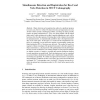Free Online Productivity Tools
i2Speak
i2Symbol
i2OCR
iTex2Img
iWeb2Print
iWeb2Shot
i2Type
iPdf2Split
iPdf2Merge
i2Bopomofo
i2Arabic
i2Style
i2Image
i2PDF
iLatex2Rtf
Sci2ools
132
click to vote
ECCV
2008
Springer
2008
Springer
Simultaneous Detection and Registration for Ileo-Cecal Valve Detection in 3D CT Colonography
Object detection and recognition has achieved a significant progress in recent years. However robust 3D object detection and segmentation in noisy 3D data volumes remains a challenging problem. Localizing an object generally requires its spatial configuration (i.e., pose, size) being aligned with the trained object model, while estimation of an object's spatial configuration is only valid at locations where the object appears. Detecting object while exhaustively searching its spatial parameters, is computationally prohibitive due to the high dimensionality of 3D search space. In this paper, we circumvent this computational complexity by proposing a novel framework capable of incrementally learning the object parameters (IPL) of location, pose and scale. This method is based on a sequence of binary encodings of the projected true positives from the original 3D object annotations (i.e., the projections of the global optima from the global space into the sections of subspaces). The t...
Computer Vision | ECCV 2008 | Object Detection | Object Parameters | Original 3D Object | Robust 3D Object | Trained Object Model |
| Added | 15 Oct 2009 |
| Updated | 15 Oct 2009 |
| Type | Conference |
| Year | 2008 |
| Where | ECCV |
| Authors | Le Lu, Adrian Barbu, Matthias Wolf, Jianming Liang, Luca Bogoni, Marcos Salganicoff, Dorin Comaniciu |
Comments (0)

